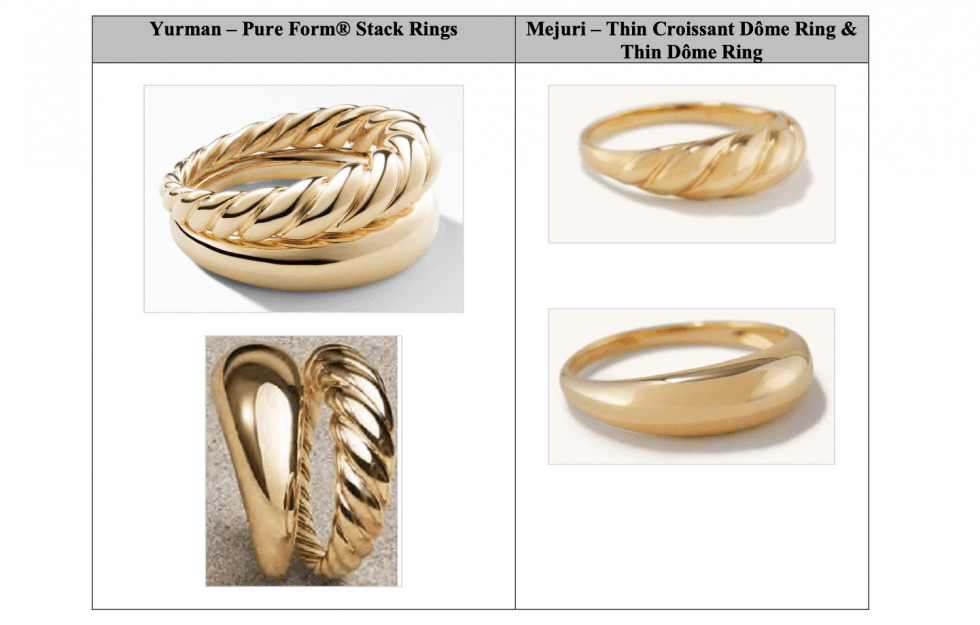Mejuri and David Yurman have settled a trademark-centric lawsuit over their respective jewelry designs. The trademark infringement and dilution clash got its start in December 2021 when Yuman filed suit against Mejuri in a New York federal court, accusing the “serial copyist” of co-opting a number of its well-known offerings in an effort to “exploit” the Yurman brand and “the goodwill it has built,” and confusing consumers in the process. Mejuri responded with claims of its own, arguing that Yurman was engaging in “an improper attempt to suppress an innovative competitor and to claim ownership of well-known, common motifs – like twist designs – that have been used in jewelry since at least the Roman Empire.” Against that background, Mejuri sought declarations from the court that it is not running afoul of Yurman’s trademark rights because no such rights exist.
Bringing the case to a close on Tuesday, Judge Ronnie Abrams of the U.S. District Court for the Southern District of New York discontinued the case “without costs to any party and without prejudice to restoring the action to this court’s docket if the application to restore the action is made within thirty days” in light of a settlement between the two jewelry companies. It is not clear what the terms of the parties’ settlement consist of, but as of the time of publication, Mejuri’s Croissant Dôme bracelets, earrings, and rings – which allegedly infringe Yurman’s Pure Form® and Sculpted Cable jewelry trade dress – are still available for purchase on its website.
Looking beyond the parties’ trademark and declaratory judgment claims, an interesting element of Yurman’s case came by way of its focus on Mejuri’s marketing. While the plaintiff’s case was limited to trademark infringement and dilution claims (and thus, did not include false advertising, for instance), it, nonetheless, alleged that Mejuri falls short on its purported Environmental, Social, and Governance (“ESG”) credentials. “Mejuri’s business practices contradict its claim to customers,” namely, its marketing of itself a “socially-responsible” company, as well as its claims that “[s]ince day one, it’s been our mission to engage with the jewelry industry in a way that compliments [sic] our values and those of our customers,” per Yurman.

The inclusion of such an allegation is worthy of note in light of rising attention by consumers, investors, regulators, and seemingly, lawsuit-filing competitors to the merits behind rampant ESG/sustainability-focused advertising by brands in fashion and beyond. Among other things, lawsuits such as this one represent an additional avenue by which brands can be taken to task – even if just from a bad-PR point of view – for what might otherwise be unactionable ESG claims (due to puffery, etc.).
The Bigger Picture – Not limited to the Yurman case, we have seen a similar claim – i.e., x company has failed to live up to its “sustainable,” “ethical,” etc. brand ethos because it is engaging in infringement – waged since the outset of this lawsuit. Early this year, Zara and its parent company Inditex filed suit against a “socially responsible” fashion brand of engaging in a “serial” scheme of copyright infringement and unfair competition in order to mislead consumers about the source and nature of their apparel and accessories. In addition to setting out infringement claims, Zara set out false advertising and unfair and deceptive trade practices claims against Thilikó, LLC and its owner Queenie Williams on the basis that it is improperly holding itself out “as an independent fashion brand and the creator and craftsman-like maker of the fashion designs in its collections.”
In particular, Zara alleged that in addition to stealing its imagery and passing off Zara wares as its own, Thilikó “lures consumers by emphasizing its social responsibility and commitment to thoughtfully designed and sustainably manufactured apparel.” However, despite Thilikó representing itself as “a socially ‘responsible’ fashion brand” that focuses on “craftsmanship, detail, and fabric,’” a closer look reveals that “nothing could be further from the truth,” Zara and Inditex contend, claiming that Thilikó’s “false and misleading statements concern matters of primary and material importance to consumers: the source, manufacturer, and designer of the product and the social responsibility of the seller.”
THE BOTTOM LINE: In case the rising tide of regulation in the realm of ESG marketing – and growing examples of litigation that centers on alleged instances of greenwashing – is not enough to get companies to tread carefully when it comes to sustainability claims and their ability to substantiate such claims, the risk that parties wielding infringement claims against them can/will use such alleged marketing failures to bolster their cases (or at least, drum up some bad press for their rivals) is worth keeping in mind.
The case is David Yurman Enterprises LLC, et al., v. Mejuri, Inc., et al., 1:21-cv-10821 (SDNY).











